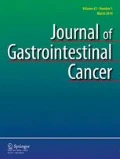Abstract
Background
Colon cancer is a major health problem and is one of the most frequent cancers all over the world. In Egypt, the incidence of colon cancer is relatively low, but its mortality rate is high. Lymphatic spread of colon cancer is one of the most important factors affecting the prognosis of patients. Recently, the lymph node ratio (LNR) has been evaluated as a prognostic parameter for survival. This study aimed at evaluation of nodal status of resected specimens and LNR, as well as its impact on the disease-free survival (DFS) and overall survival (OS) after curative resection of right colon cancer.
Methods
The institutional registry of the Oncology Center Mansoura University (OCMU) was revised for node-positive right colon cancer cases that were operated in the period between January 2010 and January 2015. Fifty-three patients met the inclusion criteria and were followed up till January 2020.
Results
A total of 766 lymph nodes were excised from the patients. Thirty-two patients (60.4%) had a LN yield of ≥12 LNs with a mean LNR of 0.257 ± 0.27. Multivariate analysis of outcomes showed that LNR was significantly correlated with both DFS (p = 0.015) and OS (p = 0.024). Moreover, the number of resected LNs was also associated with statistically significant relationship with the DFS and OS.
Conclusion
Our study confirms the validity of LNR as a prognostic tool that correlates with the survival of patients. Moreover, LNR cutoff values may help predict those of high chance of tumor recurrence.
Trial Registration
MS/20.03.1087 (Institutional IRB), date of registration: March 10, 2020, “retrospectively registered”.



Similar content being viewed by others
Data Availability
Yes.
References
Weiser MR. AJCC 8th edition: colorectal cancer. Ann Surg Oncol. 2018;25(6):1454–5.
Parsons HM, Tuttle TM, Kuntz KM, Begun JW, McGovern PM, Virnig BA. Association between lymph node evaluation for colon cancer and node positivity over the past 20 years. JAMA. Sep. 2011;306(10):1089–97.
Abdelkhalek M, Setit A, Bianco F, Belli A, Denewer A, Youssef TF, et al. Complete mesocolic excision with central vascular ligation in comparison with conventional surgery for patients with colon cancer - the experiences at two centers. Ann Coloproctol. Aug. 2018;34(4):180–6.
Nagawa H, Muto T, Sunouchi K, Higuchi Y, Tsurita G, Watanabe T, et al. Randomized, controlled trial of lateral node dissection vs. nerve-preserving resection in patients with rectal cancer after preoperative radiotherapy. Dis Colon Rectum. 2001;44:1274–80.
Chang GJ, Rodriguez-Bigas MA, Skibber JM, Moyer VA. Lymph node evaluation and survival after curative resection of colon cancer: systematic review. J Natl Cancer Inst. 2007;99(6):433–41.
Toyota S, Ohta H, Anazawa S. Rationale for extent of lymph node dissection for right colon cancer. Dis Colon Rectum. 1995;38(7):705–11.
J. S. Pyo, J. H. Kim, S. Y. Lee, T. H. Baek, and D. W. Kang, Metastatic lymph node ratio (mLNR) is a useful parameter in the prognosis of colorectal cancer; a meta-analysis for the prognostic role of mLNR, Medicina (Kaunas)., vol. 55, no. 10, 2019.
Gleisner AL, et al. Nodal status, number of lymph nodes examined, and lymph node ratio: what defines prognosis after resection of colon adenocarcinoma? J Am Coll Surg. 2013;217(6):1090–100.
Fortea-Sanchis C, Martínez-Ramos D, Escrig-Sos J. The lymph node status as a prognostic factor in colon cancer: comparative population study of classifications using the logarithm of the ratio between metastatic and nonmetastatic nodes (LODDS) versus the pN-TNM classification and ganglion ratio systems. BMC Cancer. 2018;18(1):1208.
Jakob MO, Guller U, Ochsner A, Oertli D, Zuber M, Viehl CT. Lymph node ratio is inferior to pN-stage in predicting outcome in colon cancer patients with high numbers of analyzed lymph nodes. BMC Surg. 2018;18(1):81.
Berger AC, Sigurdson ER, LeVoyer T, Hanlon A, Mayer RJ, Macdonald JS, et al. Colon cancer survival is associated with decreasing ratio of metastatic to examined lymph nodes. J Clin Oncol Off J Am Soc Clin Oncol. 2005;23(34):8706–12.
Moug SJ, Oliphant R, Balsitis M, Molloy RG, Morrison DS. The lymph node ratio optimises staging in patients with node positive colon cancer with implications for adjuvant chemotherapy. Int J Color Dis. 2014;29(5):599–604.
Y. Akagi, R. Kansakar, and K. Shirouzu, The prognostic significance of number of lymph node metastasis in colon cancer – based on Japanese techniques of resection and handling of resected specimens, Color. Cancer - From Prev. to Patient Care, pp. 509–520, 2012.
Li Destri G, et al. Predictive value of the number of harvested lymph nodes and cut-off for lymph node ratio in the prognosis of stage II and III colorectal cancer patients. J Investig Surg Off J Acad Surg Res. 2019;32(1):1–7.
Shetiwy M, Fady T, Shahatto F, Setit A. Standardizing the protocols for enhanced recovery from colorectal cancer surgery: are we a step closer to ideal recovery? Ann. Coloproctol. 2017;33(3):86–92.
Author information
Authors and Affiliations
Corresponding author
Ethics declarations
Conflict of Interest
The authors declare that they have no conflict of interest.
Ethics Approval
Yes.
Consent to Participate
Not applicable.
Consent for Publication
Not applicable.
Code Availability
Not applicable.
Additional information
Publisher’s Note
Springer Nature remains neutral with regard to jurisdictional claims in published maps and institutional affiliations.
Rights and permissions
About this article
Cite this article
Shetiwy, M., Elalfy, A.F., Eldamshety, O. et al. The Prognostic Significance of Lymph Node Status and Lymph Node Ratio (LNR) on Survival of Right Colon Cancer Patients: a Tertiary Center Experience. J Gastrointest Canc 52, 1010–1015 (2021). https://doi.org/10.1007/s12029-020-00525-6
Accepted:
Published:
Issue Date:
DOI: https://doi.org/10.1007/s12029-020-00525-6




